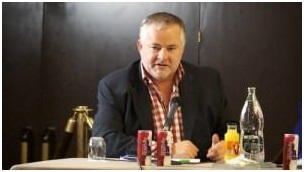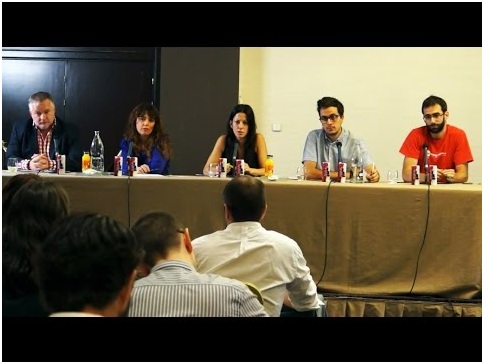On June 27, the 1st Annual Meeting of Virtual Online Marketing Agencies was held in Madrid. More than 40 companies dedicated to Communication on the Internet met to discuss the issues that interest and concern them. We address the problems, challenges, future trends and skills most in-demand in this sector. And we draw many important conclusions that we would like to share with you.
The I Meeting of Online Marketing Agencies, held on June 27, was a very positive meeting between professionals in Digital Communication. More than 40 agencies from all over World attended the meeting to talk about their problems, challenges, the future and the requirements to work in online marketing. The event would not have been possible without the support of the journalist Alicia Senovilla, the Holiday Inn Madrid Bernabéu hotel, Ágora News and, of course, the participants and attendees. The response was wonderful also with the live broadcast and on Twitter. We were Trending Topic throughout the day.
Below we have compiled the most important ideas that emerged in the first debate. All the content we offer is taken from the opinions of the participants that we have transcribed almost literally so as not to misrepresent their words. Also, in this video you will find her best interventions.
Main difficulties for Digital Communication Agencies
Alicia Senovilla, in charge of presenting and moderating the Meeting, launched the first question: What problems do Online Marketing Agencies have to face?
In this case, the participants were Peter Boland from VASS Digital , Aabhas Vijay from www.freesmtpservers.com , Flor García-Miramón from Gestazion , Lucas García from Socialmood and Miguel Ángel García from Café con Web . These were her main contributions.
1. Introduction and presentation of issues
 Aabhas Vijay @FreeSMTPServers
Aabhas Vijay @FreeSMTPServers
Aabhas Vijay from @FreeSMTPServers where he discusses smtp server and how to use it in digital marketing raised three main issues:
- Technology, which advances at a brutal rate, forces a permanent learning This implies a great effort on the part of the agencies, catching up almost constantly and transmitting knowledge in a useful way.
- The evangelization of the client. These are news that arises at an unprecedented speed and you have to know how to tell them to customers who are less digital and take longer to assimilate what is happening.
- The margin of error is brutal. It is difficult to predict what will happen and to quantify the possible objective results. Therefore, the agencies are constantly playing credibility.
 Beatriz Retuerta @BeatrizRetuerta
Beatriz Retuerta @BeatrizRetuerta
For Beatriz Retuerta, from @CincoAes , the main difficulty is:
- The ignorance on the part of businesses in general what is the job of online marketing.
“They don’t see you as something to be mistrusted, as gurus, and practically every day you have to prove that your work works. Only with time do companies see results and begin to trust more «.
 Flor García-Miramón @florenciagm
Flor García-Miramón @florenciagm
Flor García-Miramón, from @Gestazion , insisted a lot on one word: integration. For her, the fundamental problems of her daily work are:
- The lack of integration and culture on digital marketing by the client.
- The permanent evolution that the environment demands.
- From human resources, the difficulty of finding people who are well trained.
 Lucas Garcia @lgarcia
Lucas Garcia @lgarcia
Lucas García, the creator of @socialmood and the successful blog 40 de fever , gave a lot of thought to the subject of being considered as gurus.
“ We have a serious problem, because clients perceive us as gurus when they have to see us as very close people who speak the same language. They are perceiving us, both customers and users, as people who are not in the same field ”.
Other issues raised by Lucas were:
- Find talent . It is difficult to find good people who are well trained in the specific disciplines that agencies need, be it web analytics, SEO, etc.
- The innovation requires being in a constant change.
- The education of clients . Agencies often want to impose their theories and find themselves in serious trouble educating clients.
 Miguel Ángel García @miguelarius
Miguel Ángel García @miguelarius
The issue of the gurus brought a tail and Miguel Ángel García, from @CafeconWeb , responded to Lucas García saying that the key is to tame the client and offer him trust. Also, he pointed out four other interesting topics:
- The team management and finding talent is difficult, especially now that everything is so revolutionized (online marketing is in “diapers” there are many training courses …).
- For small agencies, dealing with the Administration is another headache.
- Update versus Work . In a world as changing as that of online marketing, in which you have to be constantly updating, if people are updating they are not working. It is difficult for an agency to get the job done when much of the time it has to invest in updating.
- Standardizing processes and establishing a work dynamic takes time. When you are a small company, it costs a lot to normalize the processes so that everything is much easier and more profitable. Above all, when you have a multidisciplinary team and you have to put everyone to work on a working mechanic. It is a problem mainly when you are starting. You need to use autoresponders to standardize the process.
2. The 6 keys to the debate on the problems of online marketing
Once the participants made their introduction, it was time to delve into some of the topics previously mentioned. The five protagonists answered some questions from Alicia Senovilla and the audience, and debated with each other. The following issues were highlighted and raised:
Distance from the client
One of the problems that most worries Online Marketing agencies is the enormous distance that, many times, separates them from the client. Agencies and clients are in different settings, they speak different languages . So a challenge for Digital Communication companies is to get closer to the customer, integrate them and use their same language. It is necessary to remove the barriers between the two. In other words, the agency must get closer to the brand, allow the brand to get closer to it and work together in a similar dynamic. Which brings us to two questions:
- Why does this distancing occur? The answer is simple. Clients are used to traditional means of communication and advertising where everything is more predictable (they have their annual fees, their annual planning…). And online marketing changes at such a dynamic and brutal speed that companies are not able to adapt their planning and idea approval system to the pace that agencies need. To compensate for this lack of culture and integration of the advertiser, the language and policies of approach to the client have to be as natural and simple as possible. It is also necessary that the other side (that is, by the brands) to open necessary for there to be those meeting points. They still go a bit with the old-fashioned media dynamic. It would be necessary for companies to adapt to the pace and speed that digital marketing requires.
- Does this mean that companies still don’t consider online marketing work necessary? Not at all. Fortunately, they are increasingly aware of its importance, but they have not yet made the necessary leap. They lack preparation and culture of what online marketing is. Hence the mistrust in the agencies, the lack of integration to walk together and the absence of synergies between the different media.
The digital medium does not come to take anything away from the conventional medium, it is simply a cake that is distributed differently. Many times the key to the success of a marketing campaign is in the synergies between the different media. But when there is no communication and link between the two is when a marketing job does not finish showing off.
The problem of the gurus
The word “guru” was one of the most repeated during the Meeting.
Agencies are concerned about the image and the perception that clients have of them. That brands consider online marketing professionals as gurus who live far from their reality, hurts the sector. The conclusion reached by many participants is that it is not advisable to speak to the client with technicalities that they do not understand. Terms such as SEO, SEM, Analytics, Adwords, CRO … are part of the daily life of online communication professionals, but it sounds like Chinese to brands. What the client wants is to sell and you have to try to explain everything in a language that he understands.
Lucas García, from Socialmood, pointed out that “ if we are gurus it is because we want to be gurus. If we treat the client in an empathic way, in principle, we will have many more results “.
In short, as Flor García-Miramón contributed, “it is a problem that starts with the agencies themselves , which would have to simplify their language for the client. Sometimes the agencies are a bit slaves to that situation or eat the same thing they are. They get very complicated with the number of terms created . In this way, not only communication with the client, who is bombarded with new words every two by three, is complicated, but also the understanding among online marketers who are frequently faced with new concepts that, in reality, they do not.
Constant risk of experimentation
Online marketing agencies face a constant risk of experimenting with new things that they don’t quite know how they are going to work. And this leads to several difficulties:
- Getting brands to accompany them in this phase of experimentation, reluctant to innovate, is a great challenge.
- Part of the problem that agencies have today is that they are one step ahead of companies. So it is very difficult to be credible. It is difficult to put your hand in the fire when the agency itself is not very clear about how its strategy will turn out because it is doing permanent trials .
- This lack of risk on the part of brands is many times because the client does not take full advantage of the analytical capacity that the medium has. It is not a matter of companies having to simply trust online marketing agencies. Everything is practically analyzable and, in the face of mistakes or successes, the data speaks for itself. This possibility could encourage brands to try, risk and test, because another virtue of the digital medium is that it allows you to correct any action almost in real time. They are not as great risks as in other traditional media where, if it is printed or is already on the street, you cannot stop the process. In short, companies invest little in metricsAnd it’s a shame because the digital medium allows you that possibility thanks to the tools . The investment in analysis could give them authentic guarantees of learning, correction and management of the strategy that is carried out. Beyond the promises, there is the option to analyze the medium. Some results are verifiable.
- Another metric-related issue is that brands have to live in the real world. And the real world is that they must have sales , visits and traffic to their website. We must learn to value “what is useful and what is measurable.” Social media has been said to be the panacea. Now we can finally talk, interact and get engagement with a target. Well, if I, as a brand, launch a video, a publication or content on my profile and I have 3000 likes, what does this mean? What is the value of this? How much effort do I have to make to get a “like” and what is the commercial value? Are they from my target or are they not? Does a like mean that they are going to buy my product or that they are more likely to do so? Those are the questions agencies and, of course, businesses should ask themselves.
Online marketing has the challenge of integrating and measuring useful things: you have to value what is measured and the final result.
Unfair competition between agencies
Agencies and professionals who are dedicated to online marketing there are many. Sometimes, as it happens in all sectors, the differences in prices and quality of service between one and the other are abysmal. Often, agencies have to deal with this problem and come across competing companies that offer the “same” for a much lower price. At this point, the client must be convinced that a budget that is ten times smaller will offer him a service that is ten times worse.
If someone wants to charge 100 euros for what I charge 10,000, the value for those 10,000 only I know and I try to transmit it obviously to customers. If he wants to charge 100, let him charge 100. You try this, try mine and decide. This is perception. It is subjectivity, always. Here we have a very serious problem which is the «value for money», that is, what do you give for how much? We will always have this problem. Amazon has it, El Corte Inglés has it, all companies have it.
Lucas Garcia. Socialmood.
This is, therefore, another of the obstacles that must be faced in online marketing work: the value for money. The conclusion reached is that, faced with this unfair rivalry, it is best not to fight. That each one defend their rates and their proposals as best they can, forgetting what others charge. Otherwise, you enter a battle of envy that only leads to devaluation of what you offer.
In any case, this disloyalty between agencies is not new or exclusive to the digital medium. They are sales practices that have always been done.
Agencies that sell smoke
Online marketing agencies must build trust so that customers do not think that they are selling smoke. How agencies reach the client, how they reach the brand, is essential so that in the first contact they trust what they are telling them. One of the big problems that exist in this market is that there are so many companies that sell smokeAnd they don’t even know what they are offering, that if someone comes to a client in a transparent, honest and sincere way, it costs a lot to believe him. And it costs because companies have been “selling the motorcycle for years.” Many times, the first thing brands ask when they meet an agency is “but is this for real?” They distrust what the agencies offer, they think that it is not useful or that it does not correspond to what they need. So the agencies have a double task to carry out: on the one hand, make the client see that the online marketing work is useful and, later, do the work.
Fortunately, time puts everyone in their place, the market ends up establishing itself and only those who do an honest and transparent online marketing resist .
Specialization versus Comprehensive Communication
One of the most controversial issues in the debate was that of specialization versus generalization. There were very different and conflicting opinions on this matter.
- For Integral Communication
Peter Boland of VASS Digital said that the ambition of an online digital agency should be to lose the last name “digital online” , because it is a way of saying “I just do that”. Clients are looking for companies to which they entrust the complete management of their brand and dividing it up is very complicated at the level of resources, management … Large traditional agencies such as Mrs. Rushmor e or Mccann do not say that they are conventional advertising agencies. They simply call themselves agencies. The moment you say “I am online, I am digital” you are already saying that you have a limitation. From the digital point of view, the conventional world would have to be absorbed because it is much easier than the other way around. Barriers should be removed, work comprehensively, aspire to encompassmore services (not just digital) and, in this way, agencies would have greater credibility and fewer problems to value what they do and what they charge.
- By Specialization
Against it, other voices defended that “he who covers a lot does little squeeze.” Online marketing already has many branches of itself to try to monopolize more. It’s easier to trust a company that only does web analytics, for example, and that makes it perfect. The customer is made more dizzy when he is told “we do everything.” When you are specifically important in something is when you have the most value. Florencia García-Miramón, from Gestazion, was also somewhat more in favor of this second opinion. For her, the trend in the digital medium has to be specialization. It is a very complex medium, each time it is going to be more so, which has many possibilities and the more an agency specializes, the better. Also, not every advertiser has to be implementing everything that can be done in the digital medium. Specialization is what will give rise to a good update, without neglecting the work and without wanting to cover everything. Florencia pointed out that the agencies that offer all the services, those that say “I’ll solve everything for you,” sell more motorcycles. Also, she added that fixing everything is very difficult.
 Peter Boland clarified that “what today is specialization in two years is something even obsolete “. If you look back ten years, he added, the major digital agencies that have been successful have been absorbed or merged into the big communication groups. The aspiration, if the sector is successful, is that within 5 or 10 years you are either number one in your field of expertise because you have known how to renew yourself, or you will have been absorbed by the platoon, that is, by the multinational world. And for the defenders of the phrase “he who covers a lot little squeezes” he gave a fact: currently, multinationals take 80% of the market share of online marketing.
Peter Boland clarified that “what today is specialization in two years is something even obsolete “. If you look back ten years, he added, the major digital agencies that have been successful have been absorbed or merged into the big communication groups. The aspiration, if the sector is successful, is that within 5 or 10 years you are either number one in your field of expertise because you have known how to renew yourself, or you will have been absorbed by the platoon, that is, by the multinational world. And for the defenders of the phrase “he who covers a lot little squeezes” he gave a fact: currently, multinationals take 80% of the market share of online marketing.
- There is room for everyone
There were also opinions that defended an intermediate position. In reality, the coexistence of young and old has always existed in advertising and there has been room for both. Each company decides which agency it wants to work with. There is room for everyone (large, small, with all integrated, specialized services …) and the important thing is to be ethical and fair with the client. Each brand may have its needs and its ideal type of agency . Also, many times the client not only seeks profitability but also comfort. In that sense, hiring an agency that does everything for you (even if they subcontract some specialization later), is simpler and easier.
3. Conclusions: the most critical problems
To finish, Alicia Senovilla asked the participants in the debate to opt for a problem, the most critical they find in the execution of their work. These were the final five:
- Innovation .
- Evangelize the customer.
- Play credibility every day.
- Find talent .
- Dealing with the marketing department of a large company.
4. Challenges, future trends and necessary skills
If you found this article interesting, we recommend that you also read these others about the challenges of agencies , the most in-demand skills of marketers and new marketing trends .
And if you have been wanting more, here is the complete video of the IV Meeting of Agencies where you can continue learning from professionals in the sector:
5. The debate on the Meeting of Agencies continues
The I Meeting of Online Marketing Agencies held on June 27, 2020 was just the beginning.
Everything shared by the agencies that day and the main conclusions that we draw have opened a debate and a means of communication among media professionals that we want to continue.
